The 2011 MacBook Air (11 & 13-inch): Thoroughly Reviewed
by Anand Lal Shimpi on July 28, 2011 3:25 AM EST- Posted in
- Apple
- Mac
- Intel
- Sandy Bridge
- MacBook Air
- Laptops
Thermals & Power Consumption
Both the 11 and 13-inch MacBook Air use the same 45W MagSafe power adapter as the 2010 models. To get an idea of how much power the platform as a whole uses I measured power using the same power brick and a fully charged battery on all three MBA systems (2 new, 1 old). I chose two high-load scenarios: Cinebench R11 and Half Life 2 Episode 2. The former is a purely CPU load while the latter is a good mix of CPU and GPU load.
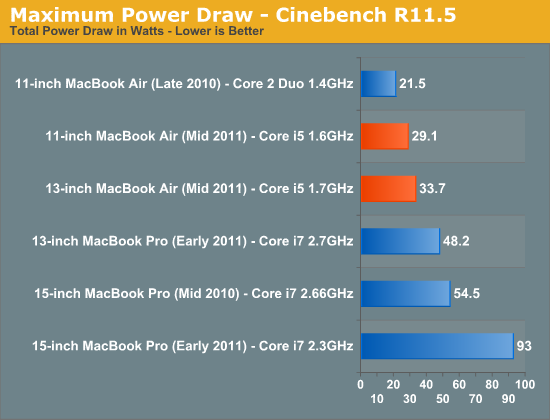
Peak power consumption has gone up significantly since last year. The 11-inch MacBook Air draws 35% more power under full load compared to its 2010 counterpart. In Cinebench R11 however, the new 11 is over twice as fast as the old one. A 35% increase in max power for a 2x increase in performance? I'll take it.
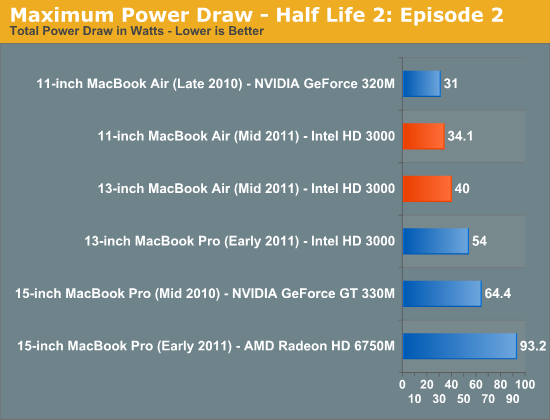
Overall power consumption isn't too bad. You're looking at under 35W for full load on the 11 and around 40W for the 13. Neither exceeds the maximum power draw of a 13-inch MacBook Pro.
How hot are the new Airs on your lap? For the most part they aren't too bad. Under a light load the fan won't spin up and you won't feel more than 31C on your lap:
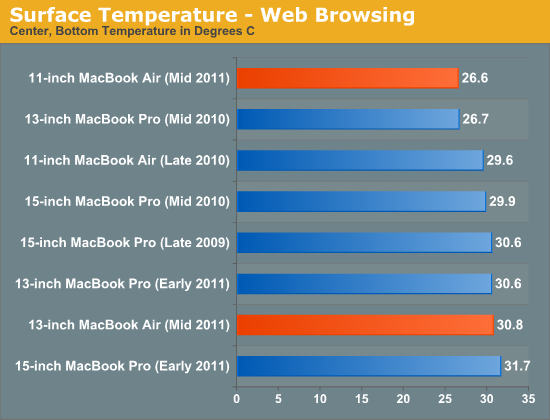
It's under load that these things can get warm. If you're just measuring surface temperature then the new 11 can hang with the 15-inch MacBook Pro:
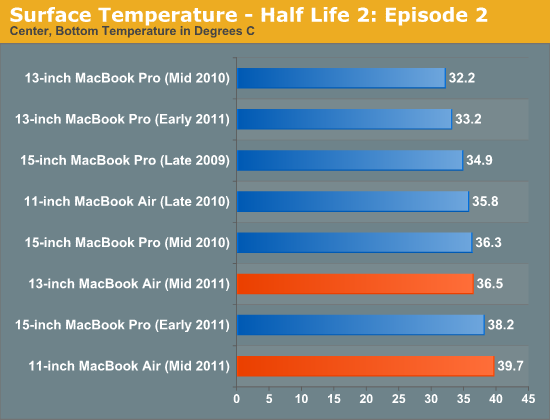
The 11-inch MacBook Air actually has it the worst. With a more cramped chassis things seem to get hotter more quickly in there compared to the 13. However max temperature is no where near as bad as the 15-inch MacBook Pro:
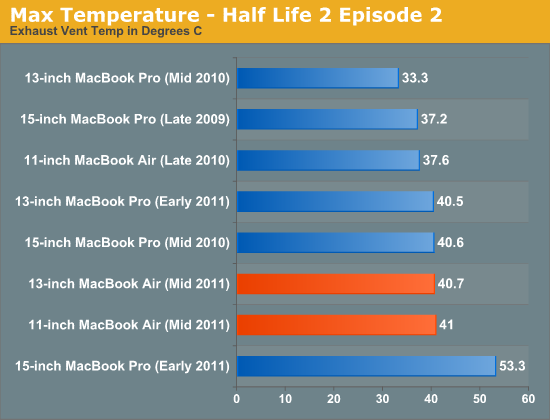
Overall the thermals seem to be in line with a 13-inch MacBook Pro, despite being confined to a much smaller chassis.










103 Comments
View All Comments
netmask254 - Thursday, July 28, 2011 - link
It's really surprising to me that the huge random speed difference, and how can Apple tolerate such an inconsistent behavior among different machines? I heard that the buyer will randomly get a Sumsung or Toshiba SSD even for the same model, that's too bad. However, maybe most Apple users don't care about it or don't know it.beginner99 - Thursday, July 28, 2011 - link
Yeah, especially since you would actually pay an apple premium for knowing what you get. But then these are more priced like windows laptops so they probably had to lower some standards.The so called ultrabooks according to rumors might even be more expensive than MBA. IMHO especially the 256 GB version is a bargain (if you get the Samsung ssd). That alone costs you like 400$ if you would manually upgrade a cheap windows laptop.
Isn't the 4k random read the main thing that prevents stuttering issues ins ssd compared to hdds?
lyeoh - Thursday, July 28, 2011 - link
I think the stuttering is more to do with the max access latency.You could have a very fast drive that averages 100MB/sec over 1 minute, but if every 30 seconds it "hangs" for one second, you would notice it.
e.g. for one second your transfer rate drops to 0MB/sec, but for the other 29 seconds it transfers at 104MB/sec.
That's why many of those benchmarks don't tell you everything about how it feels.
Same goes for fps you could get 120fps but if what appears on the screen is actually delayed by a 100 milliseconds, it's worse than something that "only" does 60 fps with 5 millisecond delay.
Not many reviewers test for latency. Anandtech does have some latency tests for a few SSDs, but so far it does not appear to be a standard benchmark.
KPOM - Thursday, July 28, 2011 - link
Interestingly, on the MacRumors forum someone posted results of another benchmark that suggested that the Toshiba outperformed the Samsung on random reads and writes, though the Samsung outperform on sequential.http://translate.google.com/translate?u=http%3A%2F...
Anand says the Samsung outperforms on both. Note that this was also the case in the 2010s. Toshibas started shipping first, and Samsungs made their way into the system in January. Apple seems to have carried them over unchanged to the 2011. I wonder what impact supply chain issues (e.g. the tsunami) and legal issues (e.g. Apple's lawsuit against Samsung) have on their purchasing decisions?
fericia - Monday, August 15, 2011 - link
My wife's 13-inch one came with SM256...arthur449 - Thursday, July 28, 2011 - link
Light Web Browsing Battery Life13-inch MacBook Air (Mid 2011) - Core i5 2.7GHz
This message will self-destruct after reading.
Anand Lal Shimpi - Thursday, July 28, 2011 - link
Fixed :)Take care,
Anand
refresh_time - Thursday, July 28, 2011 - link
Thank you for a very in-depth review.I was ordered the i7 13" without needing the bigger ssd, but after reading this, I think i should exchange it for a i5 :D
All I wanted from i7 was video work on imovie but if there is only about a 10% gain in performance, I think I'm better with i5.. (right?)
But i read the mba review here (http://www.gadgetreview.com/2011/07/apple-macbook-... and they seem to recommend i7 highly. what do you think?
I'll use the return money to buy a 1tb hardrive and a nice sleeve
iwod - Thursday, July 28, 2011 - link
I think we need something thinner, lighter, and more size to choose from. Not everyone's home can fit a bloody 27" Monitor.ImSpartacus - Thursday, July 28, 2011 - link
Apple doesn't do low margin products.Even if they offered a 24" IPS panel with all the fixings, it would approach $500. It's hard to explain to a customer why they need to spend twice as much as a bargain bin 24" TN panel.
There aren't a lot of 1440p 27" monitors on the market today for less than $1000, so Apple doesn't run into any comparison problems. The camera, speakers and connectivity features are just gravy.